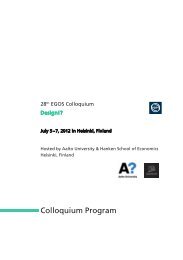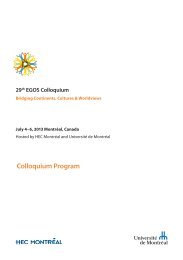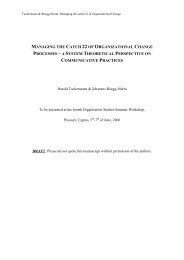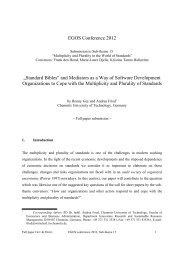A single set of standards and the multiplicity of interpretations - EGOS
A single set of standards and the multiplicity of interpretations - EGOS
A single set of standards and the multiplicity of interpretations - EGOS
You also want an ePaper? Increase the reach of your titles
YUMPU automatically turns print PDFs into web optimized ePapers that Google loves.
focused on some key concepts such as fair presentation <strong>and</strong> <strong>the</strong> true <strong>and</strong> fair view (Walton<br />
1993). Walton (1993) even argues that true <strong>and</strong> fair view has been viewed as a symbol <strong>of</strong> British<br />
accounting which has a political role while “no one knows what it means” <strong>and</strong> <strong>the</strong>re is not much<br />
academic analysis on <strong>the</strong> concept. Aisbitt <strong>and</strong> Nobes (2001) argue that <strong>the</strong> translations <strong>of</strong> true <strong>and</strong><br />
fair view are not perfect equivalents <strong>of</strong> <strong>the</strong> original term (see also Kosmala-Maclullich 2003),<br />
which I interpret to be a potential indication <strong>of</strong> <strong>the</strong> imprecise meaning <strong>of</strong> <strong>the</strong> term, as discussed<br />
earlier. The concept <strong>of</strong> true <strong>and</strong> fair view has been examined also from <strong>the</strong> viewpoint <strong>of</strong><br />
language change: The previous true <strong>and</strong> correct view was replaced by <strong>the</strong> current true <strong>and</strong> fair<br />
view as accounting rules <strong>and</strong> practice had changed <strong>and</strong> thus <strong>the</strong> underlying concept had changed.<br />
As accounting is nowadays based on estimations, <strong>the</strong> term correct gave an impression <strong>of</strong> a very<br />
precise nature <strong>of</strong> <strong>the</strong> financial accounting that cannot be achieved with accounting methods that<br />
require estimations (in contrast to historical costs). (Walton 1993, Evans 2003, 2010.) The<br />
concepts <strong>of</strong> income, expense <strong>and</strong> pr<strong>of</strong>it <strong>and</strong> <strong>the</strong>ir (lack <strong>of</strong>) definitions in <strong>the</strong> IFRS Framework<br />
have been critically evaluated by Barker (2010).<br />
The shifting meaning <strong>of</strong> accounting terms over time has also been discussed by Mills (1989) who<br />
illustrate <strong>the</strong> lexical change with <strong>the</strong> examples ratio, (<strong>the</strong> French) le compte <strong>and</strong> identifies some<br />
methods <strong>and</strong> sources <strong>of</strong> data for <strong>the</strong> diachronic study <strong>of</strong> language. Evans (2010) addresses <strong>the</strong><br />
language change in accounting as a general phenomenon. She draws on socio-linguistic literature<br />
for discussing <strong>the</strong> mechanisms <strong>of</strong> <strong>and</strong> reasons for language change. In addition to <strong>the</strong> need to<br />
express new concepts, reasons for language change include socio-cultural change, <strong>and</strong> <strong>the</strong> desire<br />
to enhance <strong>the</strong> speaker’s or o<strong>the</strong>r social group’s prestige (Evans 2010, Parker 1994). The<br />
following reasons have been identified as ways to express new concepts (i.e. mechanisms <strong>of</strong><br />
lexical change): an existing term changes its meaning (i.e. <strong>the</strong> signified changes, see also<br />
Hronsky <strong>and</strong> Houghton 2001), a word is borrowed from ano<strong>the</strong>r language or new words<br />
(neologisms) are built (Evans 2010).<br />
None <strong>of</strong> <strong>the</strong> previous studies examines in detail <strong>the</strong> procedures <strong>and</strong> policies related to <strong>the</strong><br />
translation <strong>of</strong> accounting regulations into o<strong>the</strong>r languages. However, as <strong>the</strong> translation <strong>of</strong><br />
accounting regulations is concerned, Hellmann, Perera & Patel (2010a) briefly discuss some<br />
inaccuracies in <strong>the</strong> German translation <strong>of</strong> IFRS. Drawing on <strong>the</strong> philosophy <strong>of</strong> translation <strong>and</strong><br />
9









